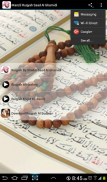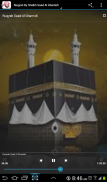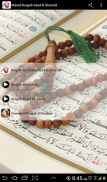





Ruqya MP3 By Saad Al Ghamidi

Ruqya MP3 By Saad Al Ghamidi介绍
Ruqya refers to the recitation of some specific verses from the Holy Qur’an or to make supplication using words that are mentioned in the Hadith of Prophet Mohammad (saw). Ruqya can be described as a spiritual healing prayer in which verses from the Holy Qur’an or the supplications from the Prophet are used in order to heal oneself or somebody else from sickness and evil eye.
Ruqya is a Sunnah of our beloved Prophet Mohammad (saw). He used to recite ruqyah for himself whereas some of his companions (Sahaaba) used to recite ruqyah for themselves. We know for a fact that the Holy Quran has been sent down on earth as a guide and cure to all human beings. Allah (swt) has said in the Quran that Allah (swt) says in the Quran, ‘We send down (stage by stage) in the Quran that which is a healing and mercy to those who believe’.
Allah (swt) says in the Quran ‘If a suggestion from Satan assails thy (mind), seek refuge with God; for He heareth and knoweth (All things), and ''And when I am ill, it is He who cures me’. Allah (swt) also says in the Quran, ‘We send down from the Quran that which is a healing and mercy for those who believe”.
These verses from the Quran ascertain that Allah (swt) has told his followers to use the words from his Quran to cure us of all evils and illnesses. This treatment is known as ruqyah.
There is ample evidence from the ahadith that prove the significance of ruqya in Islam.
Sahih Bukhari Hadith (Volume 7, Number 634) narrated Aisha (RA) Prophet Mohammad (saw) ordered me or somebody else to do Ruqya in case there was a danger from an evil eye.
Sahih Bukhari Hadith (Volume 7, Number 631) Narrated 'Aisha (RA): During the Prophet's (saw) serious illness, he used to recite the Mu'auwidhat (Surat An-Nas and Surat Al-Falaq) and then blow his breath over his body. When his pain became intense, I used to recite those two Suras and blow my breath over him and make him rub his body with his own hand for its blessings." (Ma'mar asked Az-Zuhri: How did the Prophet (prayers and peace be upon him) use to blow? Az-Zuhri said: He used to blow on his hands and then passed them over his face.) Hazrat Ayesha (ra) also said that, ‘Prophet Mohammad (saw) instructed me and everybody else to do Ruqya in case of danger from evil eye’
The significance of Surah Fatiha in ruqyah healing:
Besides being called Al-Hamd, As-Salah, Ash-Shifa and Umm al-kitab Surah Fatiha is also called Ar-Ruqyah (remedy), because there is the narration in the Sahih of Abu Sa`id telling the story of a Sababa/ Companion of the Prophet (saw) who used Al-Fatihah as a cure for the tribal chief who was stung by a scorpion. Later on, Prophet Mohammad (saw) said to a Companion,
"How did you know that Surah Fatiha is a Ruqyah?"
Some commentators opined that the focal point of healing powers of Surah Fatiha is in the power and blessings of the words: “Thee we worship(iyyaka na`budu), and Thy help we seek (iyyaka nasta`in)” The words, worship(na’budu) and help (nasta`in) have been understood to be the strongest elements for the most effective cure. In these lines we directly plead for help from the Allah (swt) (al-Shafi) whom we completely trust for recovery. This is why surah al-fatihah is one of recommended surah to be recited for ruqyah.
In Bab Fadl Fatihat al-Kitab of Kitab Fada`il al-Quran, Imam Bukhari reported that: Narrated Abu Sa'id Al-Mu'alla, ‘Once when I was praying the Prophet (saw) called me but I did not respond to his call. Later on I said, "O Allah's Apostle! I was praying." He said, "Didn't Allah say: 'O you who believe! Give your response to Allah (by obeying Him) and to His Apostle when he calls you'?" (8.24). He then said, "Shall I not teach you the most superior Surah in the Qur'an?" He said, '(It is), 'Praise be to Allah, the Lord of the worlds. '(i.e., Surat Al-Fatiha) which consists of seven repeatedly recited Verses and the Magnificent Qur'an which was given to me.
Ruqya是指从古兰经一些具体的诗句朗诵,或使中提到先知穆罕默德的圣训(SAW),使用恳求的话。 Ruqya可谓其中来自古兰经或先知的恳求经文,以治愈自己或他人的疾病和邪眼均采用了精神愈合祈祷。
Ruqya是我们敬爱的先知穆罕默德(SAW)的圣训。他用背诵ruqyah为自己,而他的一些同伴(Sahaaba)用来背诵ruqyah自己。我们知道一个事实,即古兰经已经发下来在地球上作为指导和治疗,以所有人类。阿拉(SWT)在古兰经中说,阿拉(SWT)说,在可兰经,“我们在古兰经这是一个愈合和怜悯那些谁相信发下来(按阶段阶段)”。
阿拉(SWT)说,在可兰经“如果从撒旦的建议抨击你的(心),投靠上帝;因为他听见并且认识(万物)和“”当我病了,这是他谁治愈了我“。阿拉(SWT)也说,在可兰经,“我们送下来的古兰经认为这是为那些谁相信一个愈合和怜悯”。
从古兰经这些经文确定,真主(SWT)告诉他的追随者用他的古兰经的话来治愈所有的罪恶和疾病的我们。这种治疗方法被称为ruqyah。
有从证明ruqya在伊斯兰教的意义圣训充分的证据。
布哈里圣训圣训(第7卷,编号634)叙述阿伊莎(RA)先知穆罕默德(SAW)命令我或别人做Ruqya的情况下,有从邪眼的危险。
布哈里圣训圣训(第7卷,编号631),叙述“阿伊莎(RA):在先知(SAW)病情严重,他用背诵Mu'auwidhat(苏拉特的-NAS和苏拉特铝Falaq),然后吹他的呼吸在他的身上。当他的疼痛变得强烈,我曾经背诵这两个古兰经并炸毁了我的呼吸在他身上,让他擦他的身体,他亲手为它祝福“(Ma'mar问AZ-祖赫里:如何做先知(祈祷和?愿他安息)使用吹AZ-祖赫里说:他用来吹在他的手上,然后通过他们在他的脸上)哈兹拉特麦嘉轩(RA)也说,“先知穆罕默德(SAW)指示我和其他人一样。做Ruqya的情况下,从邪恶的眼睛“危险
古兰经开端章的ruqyah愈合的意义:
除了被称为铝HAMD,作为萨拉赫,灰希法和乌姆基塔古兰经开端章也被称为氩Ruqyah(补救),因为在叙事阿布Sa`id的圣训讲Sababa的故事/先知(SAW)谁使用铝Fatihah作为治疗谁被蜇蝎子部落首领的伴侣。后来,先知穆罕默德(SAW)向同伴说,
“你怎么知道古兰经开端章是Ruqyah?”
一些评论家认为,对古兰经开端章愈合权力的焦点是在动力和祝福的话:“祢我们敬拜(iyyaka na`budu),和你的帮助,我们寻求(iyyaka nasta`in)”的字样,崇拜(na'budu)和帮助(nasta`in)已经被理解为是最为有效的治疗最强的元素。在这些线路我们直接恳求从真主(SWT)(AL-沙菲)人,我们完全信任的恢复帮助。这就是为什么古兰经铝Fatihah是推荐古兰经之一背诵的ruqyah。
在基塔Fada`il古兰经的巴布·法德勒Fatihat人 - 基塔,伊玛目布哈里报道说:叙述阿布·赛义德铝Mu'alla,“有一次,我在祈祷先知(SAW)打电话给我,但我没反应他的号召。后来我说,“安拉的使者!我祈祷。”他说:“我不是真主说:”!啊,你谁相信给你的回应阿拉(由服从他)和他的使徒,当他叫你'。“ (8.24)。他接着说:“难道我不是教你最优越古兰经古兰经?”他说,“(这是),”赞美真主,全世界的主。 “(即,苏拉特开端章),它由七个反复背诵诗篇和宏伟古兰经这是给我的。


























